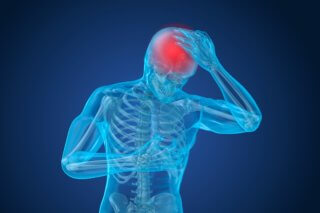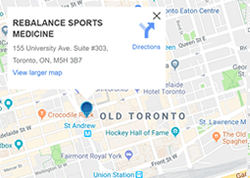Post Concussion Syndrome
 Post Concussion Syndrome (PCS) is a poorly understood and often mismanaged condition. Most people who suffer a concussion will fully recover within 2 weeks. However, in a small proportion (10-20%) of all concussion cases symptoms will persist for weeks, months and even years. It is estimated that 1.6-3.8 million sport-related concussions occur every year in North America (CDC, 2007) unfortunately leading to at least 160,000 new PCS cases per year. Given the complexity of possible signs and symptoms, one’s quality of life can be greatly affected. A person with PCS might not be able to work, can struggle with simple activities of daily living like going into busy grocery stores and cannot participate in recreational/sporting activities.
Post Concussion Syndrome (PCS) is a poorly understood and often mismanaged condition. Most people who suffer a concussion will fully recover within 2 weeks. However, in a small proportion (10-20%) of all concussion cases symptoms will persist for weeks, months and even years. It is estimated that 1.6-3.8 million sport-related concussions occur every year in North America (CDC, 2007) unfortunately leading to at least 160,000 new PCS cases per year. Given the complexity of possible signs and symptoms, one’s quality of life can be greatly affected. A person with PCS might not be able to work, can struggle with simple activities of daily living like going into busy grocery stores and cannot participate in recreational/sporting activities.
Symptoms in 3 or more of the following categories are commonly used to diagnose PCS (usually 3 months post-injury)
- Fatigue
- Disordered sleep
- Headache
- Vertigo or dizziness
- Irritability or aggression on little or no provocation
- Anxiety or depression
- Changes in personality
- Apathy or lack of spontaneity
Other common complaints:
- Light sensitivity
- Noise sensitivity
- Nausea/vomiting
- Word finding difficulties
- Trouble in busy environments
- Difficulty following conversation with several people
- Difficulty initiating tasks
- Perseverating on tasks
Management
 It is important to know that the recovery progress is slow and that there is no magic pill available. However, with adherence to an exercise program, lifestyle modifications and regular physiotherapy, it is possible to make significant changes in one’s quality of life. The treatment of PCS uses a variety of modalities to assist in the recovery process.
It is important to know that the recovery progress is slow and that there is no magic pill available. However, with adherence to an exercise program, lifestyle modifications and regular physiotherapy, it is possible to make significant changes in one’s quality of life. The treatment of PCS uses a variety of modalities to assist in the recovery process.
The multi-modal treatment process typically includes a combination of the following treatment approaches.
-
- Manual therapy in the cervical spine, shoulder girdle and thoracic spine. Manual therapy can improve mobility, joint stiffness, headaches and provides important neurophysiological input to the central nervous system. In addition, manual therapies can help to regulate the autonomic nervous system by calming down the sympathetic nervous system (which is often overactive in PCS).
- Individualized visual and vestibular rehabilitation exercises guided by your physiotherapist that can help with postural muscle strength, balance, dizziness, and difficulties with reading.
- Acupuncture can be very helpful to improve headaches, sleep, influence fatigue level, “concussion fog” and nausea.
- Weighted compression vest is new tool used in PCS – it is speculated that it calms down an overactive, “confused” nervous system by improving proprioceptive input thus helping balance, sensory reintegration and symptoms of fatigue.
View video on “Benefits of Weighted Compression Vests”
Your physiotherapists’ primary goal will be to determine the right starting point for rehabilitation, guide you through systematic and steady progressions of individualized exercises, improve your mobility through manual therapies and help you to build coping strategies. In addition, they can also provide essential knowledge and tips in regards to planning and pacing, goal setting and energy conservation.
Below is a picture of a PCS rehab tool kit- it includes common objects used daily in the rehab process. Our trained professionals will introduce their role in PCS.

As for most complex conditions, a multi-disciplinary approach is recommended for best results. Good communication and collaboration between team members is the key to success. A neuro-optometrist may prescribe special glasses with prism if you have visual issues. The sports medicine physician can monitor any pertinent medical issues and help to guide safe return to play. The naturopath will provide nutritional guidance to support health brain chemistry and healing. The chiropractor and registered massage therapist can work along side your physiotherapist to provide additional manual therapies that will provide appropriate input to the nervous system and foster good communication between the spine and brain.
If you think you are suffering from PCS and would like to improve your symptoms, book an appointment with one of our Physiotherapists. Contact us today to set up an initial consultation.
References:
- Baker JG, Freitas MS, Leddy JJ, Kozlowski KF, Willer BS. Return to Full Functioning after Graded Exercise Assessment and Progressive Exercise Treatment of Postconcussion Syndrome. Rehabilitation Research and Practice. 2012;2012:705309. doi:10.1155/2012/705309.
- Daneshvar DH, Nowinski CJ, McKee A, Cantu RC. The Epidemiology of Sport-Related Concussion. Clinics in sports medicine. 2011;30(1):1-17. doi:10.1016/j.csm.2010.08.006.
- Hugentobler JA, Vegh M, Janiszewski B, Quatman?Yates C. PHYSICAL THERAPY INTERVENTION STRATEGIES FOR PATIENTS WITH PROLONGED MILD TRAUMATIC BRAIN INJURY SYMPTOMS: A CASE SERIES. International Journal of Sports Physical Therapy. 2015;10(5):676-689.
- Marshall S, Bayley M, McCullagh S, Velikonja D, Berrigan L. Clinical practice guidelines for mild traumatic brain injury and persistent symptoms. Canadian Family Physician. 2012;58(3):257-267.
Rebalance Toronto
Rebalance Sports Medicine is a multidisciplinary clinic in downtown Toronto offering physiotherapy, chiropractic, registered massage therapy, sports medicine, naturopathy, Pilates and more.



 What to Expect From Your First Physiotherapy Visit
What to Expect From Your First Physiotherapy Visit The Benefits of Fascial Stretch Therapy [Demo]
The Benefits of Fascial Stretch Therapy [Demo] How Does Physiotherapy Work?
How Does Physiotherapy Work? Best Exercises for Low Back Pain
Best Exercises for Low Back Pain